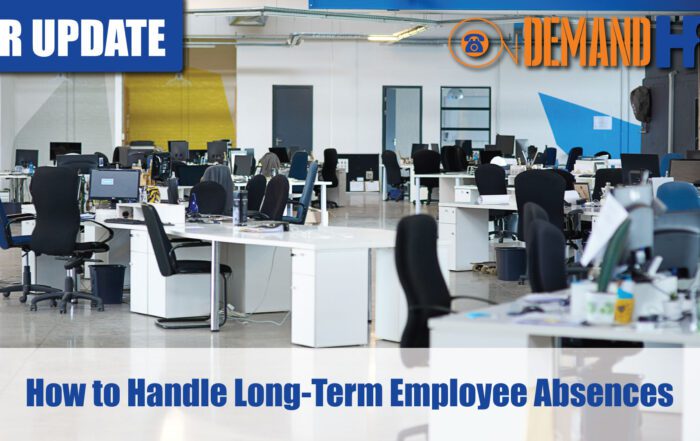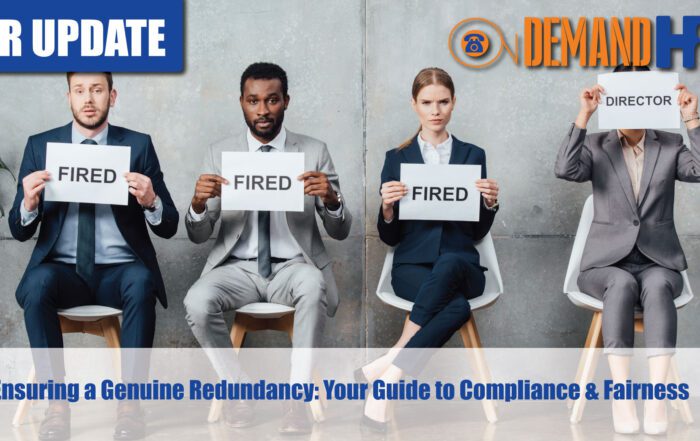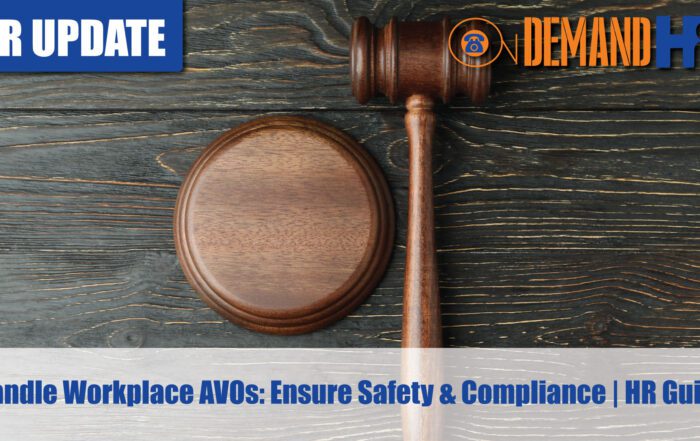“Alternative” IR Reforms for 2021
With proposed IR reform before parliament as we speak and with 2020 drawing to a close, Clint gets a little bit controversial this week by offering his views on some “alternative“ reforms he would like to see, based his experiences with clients over the past 11 years!
Please see below for a full transcript of the video
Share the HR or workplace relations challenge facing your business and one of our experienced consultants will be in touch within 24 hours with a strategic action plan or discover the best strategy yourself by accessing out free online training library.
Transcript
0:14
Ladies and gentlemen, welcome to another edition of HR Fridays. Friday the 11th of December 2020 our last for this year. My name is Clint Indrele Managing Director of On Demand HR. Once again, we’re here to present a topic today is a special edition we’re going to talk about alternative IR reforms. I’ve been looking at these IR reforms recently, that the government’s been talking about, I’ve been seeing the headlines on it, people carrying on about these things being significant. My view is that they’re quite underwhelming, actually, there’s not really much change at all, there is some tweaks, but nothing that’s of any great amount of substance. So I’m going to talk today and just give my views about what some alternative IR reforms should be. So hopefully, today’s session will be engaging, controversial and entertaining for everyone listening in.
The whole purpose of HR Fridays, for those who haven’t joined us before is to provide businesses, other organizations, professional advisors and our associate members advice, which is reality. Today obviously is a bit more of the speculative side, we’re getting into areas of possible IR reform and making suggestions. So today is a little bit different from our normal segment. Obviously, in more general terms with On Demand HR, we’ve been in the Fair Work Commission many times, we’ve done many workplace investigations, we’ve dealt with the Fair Work Ombudsman many times, this allows us to provide real perspective for our clients, not just theory and scare tactics, www.ondemandhr.com.au.
So let’s get into our special edition today on the first of all the IR reforms that have been proposed, and then I’m going to talk about some alternatives and some things that the government should really be thinking about. Okay, let’s get into it.
So, first and foremost, what are the changes that we’re about to see? Well, my view is that there’s not really that much we’re going to see that’s of any great value, we’re going to see a bit of a change in respect to the definition of casual employment in respect to WorkPac and Rossato or Rossato and Skene versus WorkPac. Those are the cases where casuals double dipped effectively they received casual wages then claimed leave entitlements. So the act is going to now deal with casual conversion after 12 months, which pretty much happens in most modern awards anyway, they’re now going to make this part of the Fair Work Act, as I understand it, there’s going to be some provision of a casual employment statement to new employees to be prepared by the Fair Work Commission. So look, there is a little bit around this, there’s a little bit of a definition change. They’re still talking in these vague and ambiguous terms, you know about is the employment ongoing or not, and this sort of stuff. So, you know, again, I see this is pretty lowball sort of stuff. In terms of the compliance. So small businesses can be fined more now for under payments, as can medium businesses as can large businesses. But I want to spend a lot of time on that. Because, you know, quite frankly, I can’t see why this is any of this is any good for the Workplace Relations system? How this is helping businesses that are struggling with COVID? I mean, I really don’t understand the logic of why this compliance stuff is being put forward at this particular point in time. Is it a trade off? for other things that have been agreed to potentially, but yeah, I really just don’t see the benefit of this. And, you know, we’re supposed to be in an environment where we’re employment struggling, and yet, we’re proposing things that are essentially just going to make things more difficult for employers in general. So severe cases can attract up to four years of jail time. I mean, you know, who knows, will the ambulance chase lawyers be simply threatening jail time now to companies when they write about under payments, we’ll just have to see how that all plays out.
Other changes that are going to happen, are going to be in respect to some of the industry awards. So there’s a whole bunch of industry awards that are in that list there. There’s going to be some minor changes around part time employees can agree to work additional hours without incurring overtime penalties. I mean, honestly, big deal. You know, these sort of situations. I mean, the concept of part time employees getting overtime for working less than 38 hours anyway, is absolutely ridiculous. So in this sort of situation where parts of employees can you know, you’re working 20 hours a week, I can agree to work additional hours without incurring overtime penalties. You know, this sort of stuff is lowball stuff really doesn’t make many changes. And a lot of part timers are already agreeing to these sorts of things through various different contractual arrangements.
You can have flexible work directions to employees to vary the location and duties but not the pay rate or the hours. I mean, again, big deal. This sort of stuff. Most of the job keeper enabled directions were relating to hours, location. All right. Your employees can continue to work from home or they can continue to work from another office, big deal, they can continue to work, other duties big deal. None of this stuff makes any real value to organizations in the real world and certainly not, you know, really an SME world, there is also the ability for loaded rates to allow employers to pay effectively an all purpose hourly rate not 100% sure how that’s gonna work yet. But, you know, once again, nothing of any great significance. So all the headlines, you’ve heard about these being significant IR reforms, I mean, talk about, you know, talk about an era where, you know, headlines are just sensationalized for the, for the purposes of clickbait, I mean, these reforms could be couldn’t be further from the truth in terms of them being described as significant.
So let’s get into the interesting part of the session. Now, when we talk about some alternatives, what sort of IR reforms should we see, I’m just going to give an opinion on six different IR reforms, I would like to see, this is based on you know, my experience with dealing with over 400 business clients in the small to medium enterprise space over the last 11 years. So let’s get stuck into it.
So the first reform, I would like to describe as the casual employment, convert or shut up principle, and that is simply this is that just make casual conversion, the same as the minimum employment period. So six months, less than 15 employees, 12 months, 15 or more employees. So I’m even prepared to go lesser on the casual employment conversion, that probably something that the unions would welcome. That the casual obligation for conversion is six months rather than 12 months. And I agree that it should be just part of the Fair Work Act and not the modern awards, it’s unnecessary to have various different modern awards with different provisions. The test that I think is important is that conversion must be based on a certain minimum number of hours being worked over that six months. So I would say something like 15 hours a week. So if you don’t work 390 hours in six months, bad luck, you can’t request conversion, I think that this whole notion of regular and systematic, and trying to define what’s ongoing and what’s not, again, this is just leading to grievance, it’s just leading to lawyers and leading to other parties disputing these things in courts in the commission. And this doesn’t do any good for small and medium business, put a number on it, put a number of hours on what is required as a minimum to request conversion, if you frankly, if you’re not working 15 hours a week as a casual employee, well, you know, what you shouldn’t really have the right to convert to, to anything more substantial than that, I’m sorry. But this rule on hours would remove the ambiguity, and would give people certainty around when you can and can’t convert, I guess, to work in conjunction with this, if you don’t hit the 390, in the first six months, well, then maybe later on, if you hit the 390 in a six month period, or the next six months, you can request conversion and something like that. So again, I think that would be a good change, give certainty would remove the need for all these, you know, lawyers and others to get involved and make massive disputes about these sorts of things. So that is my first reform. And the only other principle as part of that is that none of this double dipping around casual loadings, if you receive a casual loading you either don’t convert, and you keep your casual loading, but you’re shut up in terms of trying to claim leave entitlements later, I mean, this whole double dipping has to end It’s as simple as that. And employers can’t have the uncertainty around these things going forward. So that’s the first reform.
The second is part time provisions. So eliminate all overtime provisions for part time employees. The concept of part timers who work less than 38 hours getting overtime is ridiculous the NES doesn’t require it. And this is something where the modern awards have overreached, the modern awards have all included these provisions around if the part timers has agreed hours are 20. And you work above the 20. Well, then, you know, that should be that should be paid as overtime. You know, I’m sorry, but the National Employment Standards, if you look at the core of it, it’s 38 maximum ordinary hours in a week, the modern awards have overreached on this issue. And I think there’s two ways of solving this. So one on the ideal way would just be eliminate all overtime provisions for part timers. Altogether, obviously, above 38 pay overtime, of course, but but less between whatever the agreed hours is and 38. That should just be ordinary hours. Look, the compromise could be is that, well, if a part timer agrees to work 24 hours a week, and they need to work additional hours as requested, pay them the casual rate for those additional hours which in excess of the agreed or contracted hours. That way, the accrual of leave entitlements is still based on the permanent hours, the permanent employment is still intact. The casual rate then comes into play for any extra days that are kind of ad hoc, obviously parties can agree to increase the part time hours in the future, you know, as they may do so. So again, that would be a nice reform to see just again, remove this ambiguity around part time employment and make parts of employment more flexible. I mean, we hear grievance about all this insecure employment. But yet, you know, no one wants to make part time employment flexible enough so business can use it. This is why business uses casual employment as it currently stands because the part time flexibilities are inadequate, and they still are inadequate, even after these reforms. So this reform would certainly be better.
The third reform I’d like to see is on Annualized Salary arrangements. And quite frankly, this reform earlier this year in March 2020, is an absolute joke. This current reform for annualised salary arrangements or the current, provisions in place in the Modern Award require the employer to have an annual reconciliation of the hours worked against the salary, the outer limits of the overtime hours that will be included, and the penalty hours that will be included, and the details of all of the provisions of the award that are satisfied. These provisions are ridiculous. I mean, small businesses do not aren’t going to do this stuff, for starters. So they’re almost always going to be in breach unless they’ve got professional advice. And and you know, it makes no sense. It creates uncertainty with parties. You know, what happens if the salary increases? Do you then issue a new Annualized Salary letter updating, you know, what the outer limits are, again, just so much compliance in these situations that it doesn’t make sense, what I think would be much easier, much simpler in this situation is set an annualized exemption rate for all modern awards. The registered clubs award actually does this very, very well. So what I propose is that every every modern award has a weekly rate. So then what you do is take the weekly rate at 20%. And that gets you a certain level of exemptions. So if you pay a salary above 20%, more than the minimum weekly rate under the Modern Award, you get certain exemptions. And those exemptions might be you know, overtime within the usual five days work, early morning night shift penalties and general shift penalties and maybe things like weekend penalties, but maybe not public holidays. So that’s what a 20% exemption might look like. And then and then you have a higher exemption, which is maybe a 40%, which is like an all in where you cover pretty much everything. So that would be all over time, early morning night, shift general shift penalties, weekends, and public holidays. So have two set exemption rates, stick to them, no more Outer Limits reconciliation, all those rubbish provisions that we’ve got, right now, the exemption would be automatic based on the salary being paid. And I’m sorry, but if you’re getting 20%, or more than 20%, or more than 40%, above the award, you’ve got no moral basis for saying that you’re underpaid wages. And there shouldn’t be scope for under payments to be brought in such technical and quite frankly, frivolous circumstances. So that would be a great reform to see Annualized Salary arrangements put to or move to some sort of annualized exemption rate with set figures of what those exemption rates would include in cover.
Let’s go to small business provisions. We’ve heard for ages, information about the Small Business Award, and you know that we need to have a Small Business Award. I think there’s another way of doing this. And the other way of doing this is having a clause in every modern award that deals with small business provisions. And I think, look, small business should be more around the 20 employees or less, but that, you know, that’s neither here nor there, the 15 or less, maybe you keep that as it is. But have a dedicated clause for each small for small businesses in each model award have lower rates of pay. And look, I know this is controversial. But by 10 to 15%. The fact of the matter is that larger businesses, you know, are in a greater position to afford higher wages when compared to their smaller counterparts. If it means that the wages for larger businesses need to go up a little bit to offset the, you know, the reduction in the smaller businesses, that could be another option. I don’t like that. But you know, that might be a compromise. The other thing as well is that potentially you could have two tiers, you might have an 80% of the you know, the full wage, if you’ve got 10 employees or less 90%. If it’s 10 to 20 employees a little bit like how Junior rates work in the award. The other option, which you know, could work either in conjunction with this or outside of this is, as an alternative. You could have a lower casual loading for small businesses and people you know, some people will scoff at this and say, oh, but you know, you’re reducing workers rights, all this sort of thing. And, you know, this is not justified, but when you think about it, small businesses already have lower protections in some areas. So first of all, there’s no redundancy pay, and second of all, there’s a higher minimum employment period. So the 25% casual loading is supposed to be compensation for the benefits of permanent employment. Well, if there’s no redundancy pay for small business, then how is it justified that the casual loading for small business employees is the same as it is for larger businesses. So I think there is a justification for that casual loading being reduced to, you know, 15%, maybe 12 and a half percent, something like that. The other thing, the Small Business provisions in the modern awards should deal with is things like the flexibility on breaks. I mean, if you’ve got a retail shop with one person in a half an hour unpaid meal break, might not be practical. And you know what, it might not even work in the best interest of both parties. If someone can continue working, get paid for that lunch break, and have some food and drink at their workstation, well, Isn’t that better than then not working for half an hour, getting paid half an hour less, because of some, you know, some obligation under the Modern Award? I think this whole notion of crib breaks is something that, sadly, we’ve actually seen go out of the award system. And I think it’s something that should be brought back in particularly for the smaller businesses, the hours of work should be more flexible in the Small Business Awards, there should be a greater scope, in the hours of work for those arrangements without incurring any penalty, rate. So without incurring the early mornings, and the night shifts, fair enough for weekend penalty rates, but certainly some of those ones around, you know, the pre 7am or after 10pm, should be scrapped for those situations. And the other thing I’d like to see in the Small Business Award is, is is the overtime rates either being capped at time and a half, or maybe a time and a quarter time and a half transition or some sort of kind. So, again, I think those would be sensible things for small businesses, and believe it or not, would also lead to will also lead to, you know, more more meaningful employment for a number of those persons.
Let’s move on to another proposed reform, I’ve got two more ideas that I’m going to put out there. So the other one is around unfair dismissal. So at the moment, we’ve got this notion that you can apply to the Fair Work Commission for unfair dismissal. And that basically, the commission can award you know, up to 26 weeks wages. And, frankly, I think that for someone who’s been employed for, you know, a year, I mean, I’m sorry, but I don’t care how harsh the termination is, you don’t deserve to get 26 weeks of compensation in those situations. So what I’m proposing is a notion of what would be called the MCS or the maximum compensation scale for unfair dismissal based on length of service. So and I think there should also be deductions for redundancy paid and notice periods paid to eliminate double dipping on unfair redundancies. Because what we what we currently have a situation where you can be made redundant, you could you could get theoretically, you 16 weeks, for nine years or more. Plus, you could get your four weeks or five weeks notice and then still have a crack at unfair dismissal. So there shouldn’t be any double dipping in this in this regard. At the end of the day, section 392 of the Act currently takes into account the remuneration you have earned, since the dismissal in factoring in how compensation is awarded. So what I like to see is a maximum compensation scale. But what I’ve actually done is just created that scale out of thin air, and I’ve come up with it, and it starts at four weeks, and it goes up to 26 weeks. And the idea is that if you claim an unfair dismissal, this is the maximum compensation you can get for the period that you were employed. And what you can also do is, and this is a way of just eliminating claims for unfair dismissal altogether is that the employer can pay the maximum compensation to an employee. And that would be a jurisdictional objection for unfair dismissal. So basically, what you do is you say, right, you’ve been there for three to four years, I’m paying you 10 weeks or whatever the figure is. But that gives me a, you know, essentially an exemption from those unfair dismissal claims and give me a jurisdictional exemption. So the employer can opt out essentially opt out of the employee taking the claim by paying the MCS essentially. So again, it’s an idea that’s out there, it would certainly reduce the number of unfair dismissals significantly. What’s the point of spending a whole bunch of money paying lawyers, consultants, and you know, consultants even like us who represent clients in the fair work commission, when the money could go to the employees in this situation, and actually, you know, deliver some greater benefit to them If they have been terminated for whatever reasons that might be. So the other thing I’d like to see on unfair dismissal is this notion of, you know, all if I’m award covered under up over the high income threshold, I can still make an unfair dismissal. I mean, that’s just crap. I mean, they should just get rid of this. If you’re above the high income threshold of 153,000. Bad luck. You can’t make an unfair dismissal. Again, this creates almost a situation where as soon as someone’s above the high income threshold, let’s kind of conjure up an argument that someone’s award covered so they can make an unfair dismissal. This is ridiculous, should be should be abolished. I think also look, reinstatement should be eliminated for two reasons. Number one, it’s extremely rare. It’s a thing of the past. And it should always be employee prerogative to keep who it wants provided fair compensation is paid. So the commission should abolish reinstatement. It’s so rare. I know that will probably upset a number of unions. But again, even the unions are becoming very pragmatic with this stuff these days, in, you know, negotiating settlements and compensatorary settlements these days. And, you know, really do you really want to go back to an environment where an employer has literally terminated your employment and has you know, unequivocally indicated that they do not want you to work for that business anymore. So I would abolish reinstatement and make those other changes to unfair dismissal certainly would reduce the number of claims probably would reduce the importance of, you know, various people being employed in the commission, but that is what it is so,
But there are other things I think the commission could play an important role in and that takes me to reform number six. So reform number six is around general protections and underpayments. So I think first of all general protections claims are an absolute joke. The whole concept of that someone can commence a general protections claim based on a workplace, right is a joke, it’s too ambiguous, the argument can be made for pretty much anything, the I’ve got a workplace right to do this, I’ve got a workplace right to do that. You can argue any workplace, right that you like, for the purposes of running the claim, again, ambiguity, claims, legal action, you know, this, all this stuff’s all dragging businesses down. And frankly, again, even for employees, you know, the involvement and the reduction of their settlements based on, you know, parties being involved and, you know, negotiating these things on their behalf. It doesn’t it doesn’t great create a great deal of value. What I think would be good, though, is that, okay, the discriminatory based claims continue, but under the Fair Work Commission, so the Fair Work Commission to deal with any employment based discrimination claims, in a similar way to the way that they would deal with unfair dismissals. So eliminate, essentially part of the general protections, the discriminatory claims come under a discrimination based claim, or something the fair work commission would handle, they do a lot more efficiently than, frankly, the AHRC. And those bodies. I think that the use of the MCS, the maximum compensation scale I just spoke about could also be used in these types of claims. Look, that might be resisted because of case law. I know there is some cases, for example, you look at like the Richardson and Oracle case around, you know, sexual harassment and the sort of money paid out in those situations. Look, maybe that would create a barrier to the MCS being used in a discrimination based claim. But again, I think we need to try and have some limits on these things that we need to have, you know, some certainty and some, you know, some some sort of science and a little bit of, you know, a little bit of metrics around this, you know, the length of the longer your employment is the more significant the dismissal is more significant the payment should be, but there still should be, you know, there should still should be parameters around these things. Again, I think with underpayments, I think the Fair Work Commission could also handle that my observation of the Fair Work ombudsman handling of this is that sometimes they are particularly keen to chase things. And sometimes they are completely not keen at all. And and it seems to really vary significantly, depending upon who the who the case manager is, or who the officer is, or the compliance officer is looking at it. And I can’t I mean, I’ve looked at the enforcement policy, and I can’t understand how it how it how it is applied in reality. So again, I think that the FWC process could be similar to an unfair dismissal. And I see that look, rather than, you know, talk about harsh fines and criminality for businesses that are under paying, or that I found to be under paying. Why not just make the process easier, make the processes easier, get employees to get a result faster. That the better outcome here is to make these things more accessible, rather than pushing employees through the courts or, you know, pushing them through a system that’s not delivering results in terms of consistent compliance, look at this as an alternative. So creating the barrier for them to get into those types of claims, or address those types of matters much more simpler.
So that’s it for today. So that’s my six IR reforms. I’m sure that you know, people who watch this back and think some of them are quite controversial, you may think some of them don’t even work. But I certainly think there’s a lot of merit to these things based on what I’ve seen, I think it would reduce so much in terms of dispute and grievance. And I think that look, if you do look at these things objectively, there is something in it for everyone. I think that there are areas where we can increase the protections for employees, particularly around stuff like conversion, but then balance that against you know, things like well, you but you’ve got to do a minimum number of hours, there’s got to be some sort of checkpoint of hours that you have before those claims can be made. So I really appreciate you listening into today’s session. Thanks very much.
I’ve got a question here is actually from from Adam Grinberg. And we’ve got here a question about the establishment of uniform terms under awards reduce other payment claims by making awards simpler to administer also. Yeah, I think that that’s, um, that certainly is right. And I think there’s there’s work to be done around reducing, you know, under payments, just in terms of making them simpler. And a lot of these underpayments are so technical. They’re so technically based and they’re based on, you know, I mean, look at look at the large organizations that we’ve had, that have basically failed to essentially have compliant workplace relations affairs. I mean, it beggars belief that some of the large organizations we’ve heard about recently, if they can’t get it right with, you know, industrial relations, lawyers, HR dedicated HR teams, what chance in hell do small businesses have to be able to do this stuff? So, a great comment there from Adam, who is also an excellent workplace relations consultant in Victoria. Thanks very much for your comments on this. And yeah, look, your contributions are always welcome. If anyone else has got any more questions in the last 30 seconds or so feel free to shoot them really quickly before we head off but once again, it’s been great having you on HR Fridays for for 2020 we will be resuming in the new year. I am going to be taking a break from HR Fridays next week as we wrap up On Demand HR’s yearly works and and start planning for 2021. Stay tuned for some really interesting topics. Let us know if there’s any topics of interest that you would like and we will certainly look forward to your company in New Year. My name is Clint Indrele, Managing Director of On Demand HR. Have a great weekend and we’ll speak to you soon.






